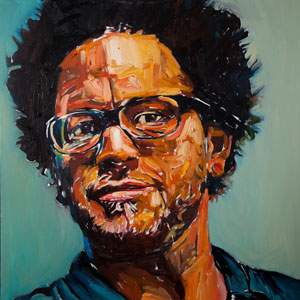
At home with Beverly McIver, with some of her works of art. Photo by Jared Lazarus/Duke University Photography
Artist Beverly McIver has found inspiration in many cities, but these days relocation has become increasingly more difficult. “I hate to move,” says the newest member of Duke’s art faculty straddling on an ottoman in the living room of her Durham home.
But the award-winning artist wants to remain flexible and “not so uptight about change.” She concedes she has produced some of her best work based on the cities where she’s lived and worked. The change of scenery “totally feeds my soul as a human being, it feeds my art.” The key, she says, is staying open and flexible.
“In New York I was painting all the weird people I saw on the subway. When I’m home I paint my family. I’m sure I’ll find a group of people to paint while in Charlotte,” McIver says.
A leading figure in the contemporary art world, McIver is spending the fall semester in residency in Charlotte before she begins teaching at Duke in January. “Although I’m moaning on the inside about going to Charlotte, I know it will be good and scary and painful and joyous. Yeah, that’s my life."

McIver will join the university’s Art, Art history & Visual Studies department as the Esbenshade Professor of the Practice in Studio Arts. She previously taught at her alma mater, North Carolina Central University, North Carolina State University and for 12 years at Arizona State University. She has also held numerous residencies, including the latest 3-month residency at the McColl Center for Visual Arts in Charlotte. She hopes to finish some projects in the works -- paintings of her cousin Sharon, who had a leg amputated, and one of her father
She takes photos of her subjects that she turns into lush and emotional portraits, the thick paint of primary colors, like frosting on a cake. She chooses to focus on themes such as transition, dancing and depression. Whatever a viewer feels when they look at her paintings, she assures she has felt the same emotion many times over in creating it.
“My inner voice is loud and is always telling me what to do. It’s always saying you should take a picture of this guy and I’m like ‘why?’ -- but then I just do it. The more I do that, the more I learn about myself,” she says. “My problem is that I don’t have enough time to paint. That’s what Charlotte is about. It will help me see my father, my cousin, (my sister) Renee in an objective way, and that will create a whole new set of paintings.”
McIver’s work can be found in a number of public collections, including the Baltimore Museum of Art, the North Carolina Museum of Art, and the Weatherspoon Art Museum in Greensboro. She recently was selected for the Smithsonian’s Outwin Boochever Portrait Competition, which included her work in its national portrait gallery. The winning piece is a self-portrait is titled, “Depression.”
“Sometimes I dream about painting flowers,” jokes McIver, of her emotionally revealing work. “People come up to me and say ‘I was depressed too,’ Paintings give me permission and a way to share these feelings without guilt. I have to keep telling that very human story. I never get into a rut because I’m always thinking and seeing.”
Her relationship with Duke began 25 years ago when she taught art while now-deceased Duke art professor Vernon Pratt was on sabbatical. At that time, McIver was very impressed by Duke students.
“I like the kids. They’re really smart, excellent painters. All of them were minoring in art, none of them were majors,” McIver says. This time around, she’d like to encourage more majors by focusing on the entrepreneurial side of art.
“I want to bring an awareness that you can be an art major and make paintings and be very successful at doing that. You don’t have to necessarily have a plan B. If you do what you really love, the money will come. For me, it was always the art thing and it worked out,” she says.
The Greensboro-native who grew up in the projects feels fortunate to have lived in many locales. But home is in North Carolina. In 2004, after her mother passed, McIver fulfilled a promise to care for her intellectually and developmentally disabled older sister, Renee. The experience was documented in the 2011 film, “Raising Renee.” (See trailer below)
“I moved back to North Carolina in 2007 and took the job at Central because I needed help taking care of Renee,” she says. “It was the first time I was able to choose where I want to teach, where I want to work, where I want to live. I’ve been teaching for 25 years and never was able to choose before. It’s nice to be able to choose -- and it’s nice to be chosen.”
Last year an exhibition of McIver’s work, “New York Stories,” appeared at the Craven Art Gallery in Durham.
“I love Durham, I love the diversity and I wanted to stay in the community,” she says of her decision to join the Duke faculty. “I love that the North Carolina Arts Council supports artists. Being able to stay here in Durham was extremely important. I feel comfortable here. And to be able to work with the quality of student that is at Duke is important to me.”
McIver stays in touch with many of her former students and hopes to build similar relationships with Duke students, bringing her own perspective to class.
“I grew up poor in the projects in Greensboro and now I’m middle class. Durham allows me to feel comfortable in these two worlds that I straddle,” she said. “Some Duke students may not have experience mingling with someone who grew up on welfare. I’m excited about bringing that difference to Duke.”